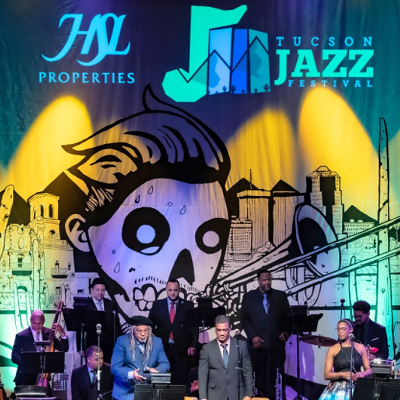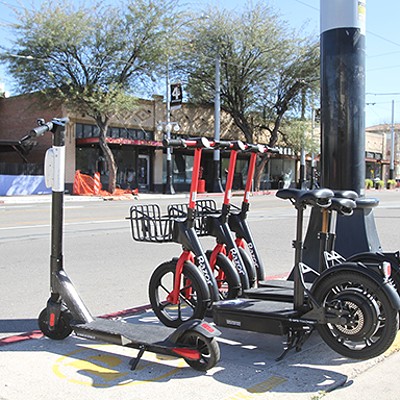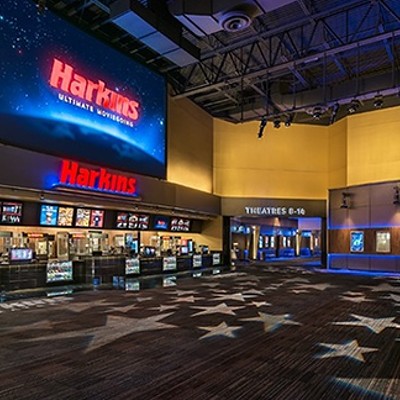So what if the proposed site has a dubious history?
If they eventually give the go-ahead for the project, they might then approve other changes at the center, despite the fact that voters said no to a somewhat similar idea a decade ago.
To replace the existing 30-year-old arena, which holds up to 8,500 people for concerts, TCC director Rich Singer predicts the new building could seat as many as 10,000. The major change that would result, Singer says, is that minor-league sports teams, including hockey, basketball and arena football, might come to Tucson.
Assistant City Manager Karen Thoreson, however, sees the biggest advantage of the new building as being an increase in the number of events at the arena by an estimated 50 percent, with total revenues doubling.
"We'd get a lot more entertainment," according to Thoreson, "because the (private-sector) operators would bring ready-made tenants along with the current events."
Singer concurs with that assessment, believing some popular musicians, who now bypass the community, will be tempted to come to town. "There is a big difference," he says, "for both performers and the audience (between an old arena) and a new, fresh exciting venue."
Thoreson indicates that if the council approves the arena concept, by early February, the city would solicit proposals from the private sector to build the new structure. To pay for construction, tax-exempt financing would be used, a practice that has sometimes proven controversial--such as in the case of Tucson Electric Park--because of the potential burden it places on the government budget. Even though the TCC costs taxpayers millions of dollars every year to maintain and operate, Singer says the revenue stream generated by the new arena must be sufficient to pay off the debt on the building.
To determine if that would happen, a financial analysis of the proposals will be performed over the summer; Thoreson expects the council could be given a recommendation by this fall.
The economic feasibility of the arena idea is important, especially given its location at the southeast corner of Congress Street and Interstate 10. For many years, the site was home to a paint production plant; it polluted the area before it was cleaned up after the business was torn down. Several years ago, the site was suggested as the location for a new regional visitors' center. After the city shelled out hundreds of thousands of dollars to have plans for the building prepared, the proposal never materialized.
After that costly mistake, the site was slated to become the home of the Rio Nuevo Sonoran Sea Aquarium. Financial reality, combined with public ridicule, killed that idea.
But arena proponents hope that next time is the charm.
While Thoreson wouldn't venture a guess at the approximate cost of the proposed building, Everett, Wash., recently opened a new special events center, including an arena which seats 10,000, with a total cost of $71.5 million.
This facility will be managed by Global Spectrum, a subsidiary of Philadelphia-based Comcast Spectacor. Todd Glickman, a vice-president of sales for the company, indicates his firm is interested in the Tucson project, and he believes the city is headed in the right direction.
There are numerous advantages of this type of public-private partnership, Glickman says, including a more cost-efficient operation by private-sector managers. But he admits the construction projects can sometimes be controversial because of the type of financing involved.
Another potential controversy could involve local groups that now use the existing arena at a taxpayer-subsidized rate; they could be forced to pay more at a new arena, or pushed out altogether. But Singer says this doesn't have to be a problem.
"If the city wants to (continue to) help community groups, it can do so," he says.
Singer also believes the private sector day-to-day managers of the facility could be influenced by a quasi-public authority that could be established to oversee the operation of the new arena.
Mark Rasdorf, general manager of a series of Broadway shows that will be coming to the TCC music hall starting in September, hopes the new arena is built.
"It's forward thinking in terms of economics and conventions," he says. "I think it's a great idea."
The convention connection to the new arena is a complex arrangement. If the City Council decides to proceed, the present arena could be replaced by meeting rooms, which might attract more than the current half-dozen conventions that annually use the facility.
On the other hand, when voters in 1994 were asked to approve $5.4 million in bond funds to develop 19 meeting rooms at the TCC, they said no by a 2-1 margin. But based on its tradition of ignoring the will of the voters when it comes to the Convention Center, that little civics lesson probably won't stand in the City Council's way if they want to go ahead with the meeting rooms.












